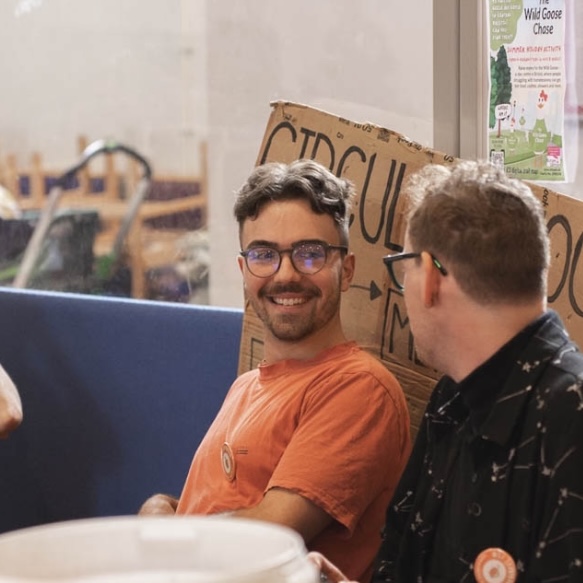How to Start Composting at Home in Bristol (and Beyond)
- Alex Montgomery
- Oct 20, 2025
- 4 min read
Updated: Oct 25, 2025
Why Compost at Home?
Every year, UK households throw away 6.6 million tonnes of food. Most ends up in landfill, where it releases methane, a greenhouse gas 25 times stronger than CO₂.
Composting transforms that waste into living soil. It’s simple, local climate action that anyone can take:
Reduces emissions by keeping organics out of landfill
Rebuilds soil fertility and microbial life
Saves money on fertilisers and bin liners
Connects you to natural cycles right at home
At Generation Soil, we call it kitchen-table climate action: regeneration that starts with your leftovers.

Choosing a Composting Method That Fits Your Space
There’s no one-size-fits-all composting solution. The right method depends on how much space you have, what you eat, and how hands-on you want to be.
Bokashi Composting (Perfect for Flats + Small Homes)
Bokashi is a fermentation-based composting system that works indoors with zero smell or mess.
How it works:
Add food waste (including cooked food, dairy, and meat) to a sealed bokashi bin.
Sprinkle with bokashi bran inoculated microbes that ferment the scraps instead of rotting them.
After two weeks, the fermented waste can be buried in soil or added to a compost pile to finish decomposing.
Why it’s great:
✅ Works in small kitchens
✅ No odours or flies
✅ Produces bokashi juice, a nutrient-rich fertiliser for houseplants
Bokashi is the method we use in the Bristol Living Compost Project because it’s clean, fast, and community-friendly.

Wormeries (Best for Courtyards or Balconies)
Worm composting (vermicomposting) uses special worms to digest fruit and veg scraps.
Why it works:
Worms eat food waste and produce castings, one of the richest organic fertilisers on earth.
Perfect for small outdoor areas or shaded balconies.
Tips:
Feed little and often, avoiding meat, citrus, and oily foods.
Keep bedding moist with shredded cardboard or coconut coir.
Harvest worm tea for plants every few weeks.
Traditional Compost Bins (Ideal for Gardens)
If you have outdoor space, a simple compost bin or heap still does the job beautifully.
Layer it right:
“Greens” = kitchen scraps, coffee grounds, fresh grass.
“Browns” = dry leaves, cardboard, straw.
Aim for roughly two parts brown to one part green.
Turn every few weeks for airflow, and in 3–6 months, you’ll have crumbly, earthy compost ready to use.

What You Can (and Can’t) Compost
✅ Compost These:
Fruit & veg scraps
Tea bags & coffee grounds
Eggshells
Bread, pasta, rice (small amounts)
Leaves & grass clippings
Shredded paper or cardboard
🚫 Avoid:
Plastic & biodegradable liners
Liquids like oil or milk
Meat & fish (unless using bokashi)
Diseased plants or pet waste
Remember: balance greens and browns. Too many wet materials cause smells; too many dry materials slow decomposition.
How to Keep Compost Smell-Free
Smell means imbalance. Fix it fast:
💡 Add dry materials like cardboard or straw.
💡 Mix weekly to aerate.
💡 Keep bins covered and sheltered from heavy rain.
💡 For flats, Bokashi’s airtight design keeps everything odour-free.
At Generation Soil workshops, we show how simple adjustments keep compost clean, quick, and climate-positive.
Using Your Finished Compost
You’ll know it’s ready when it’s dark, crumbly, and smells like woodland soil.
Use it to:
Enrich vegetable beds or raised planters.
Mix into potting soil for houseplants.
Mulch around trees & shrubs to lock in moisture.
No garden? Donate to neighbours, community gardens, or a local compost hub. Your waste can help others grow.
Join the Bristol Living Compost Project
If you’re in Bristol, you can close the loop by joining our city-wide compost network.
Members receive:
Weekly food waste collection, clean sealable replacement bins, and bokashi bran.
Living compost deliveries back to their doorstep.
Access to workshops and volunteer sessions at our Food Forest Market Garden.
It’s composting made easy, and your scraps help regenerate Bristol’s soil one bucket at a time.
Learn with Generation Soil
Composting is the entry point to regeneration. That’s why we offer:
Bokashi & Home Composting Workshops for beginners.
School & Community Sessions on soil, microbes, and climate.
The Compost Clinic for tailored advice on garden composting or soil testing.
Sign up for our Generation Soil Revolution Newsletter to receive The Beginner’s Guide to Compost, Microbes & Regeneration.
Composting as a Climate Solution
If every household in Bristol composted their food waste, the city could cut thousands of tonnes of CO₂ each year, restore urban soils, and create new green jobs.
Across the UK, community composting could:
Reduce landfill methane emissions by up to 20 %.
Replace synthetic fertilisers with natural alternatives.
Support pollinators & urban biodiversity.
Composting isn’t waste management, it’s climate regeneration at the household (and city) scale.
A Regenerative Future Starts at Home
No matter where you live, a flat, terrace, or farm, composting reconnects you to life beneath your feet.
Each peel and coffee ground becomes part of a larger story: rebuilding soil, community, and resilience.
So start small:
Buy or make a bokashi bin.
Join a local compost hub.
Share what you learn.
Together, we can grow a city where every bucket of scraps becomes new life.




Comments